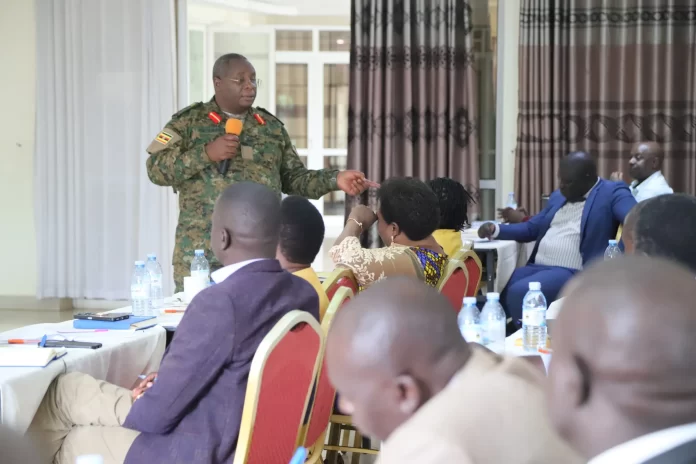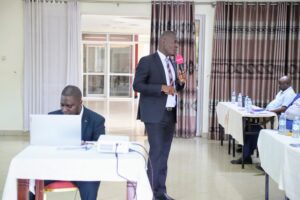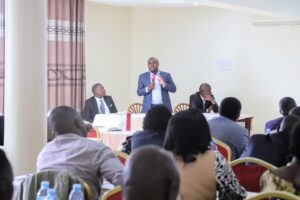
Colonel Emmy Katabazi, the Deputy Director General of the Internal Security Organisation (ISO), has implored the Resident City Commissioners (RCCs), Resident District Commissioners (RDCs), Deputy RCCs and RDCs, Assistant RCCs and RDCs, Regional Internal Security Officers (RISOs), and District Internal Security Officers (DISOs) to build an equitable monitoring system mechanism of government programs to alleviate poverty and ensure an enhanced socio-economic transformation in Uganda.
Col Katabazi was giving a keynote address to the RCCs, RDCs, DRCCs, DRDCs, ARCCs, ARDCs, RISOs, and DISOs from the Acholi sub-region during a three-day capacity-building retreat at Bomah Hotel Limited in Gulu city on August 6, 2024.
He emphasized that as RDCs, who are representing President Museveni at the city and district level, they need to ensure that the security in their areas is stable and make sure that all government programs are implemented.
“If the President appointed you, count yourself lucky and be committed to executing the tasks assigned to you. Don’t wait for problems to escalate, but be strategic by identifying the issues affecting the country before they run out of hand,” the Colonel said.
The Deputy Director General called for professionalism and discipline among the participants, encouraging them to abide by law and respect the societal norms of morality by behaving in a more magnified manner.
“Part of the problems affecting you and the work are social. Avoid drunkenness and other morally unacceptable behaviors in your areas of jurisdiction,” he said.

The Colonel cautioned participants against engaging in corruption tendencies and to desist from it in all possible ways because it undermines the country’s development. He instead urged them to interest themselves in executing duties assigned to them in a more upright manner and fight against corruption.
He called for holding regular and continuous meetings to ensure effective fulfillment of government commitments.
“You sit in district council committee meetings. You are the one who knows the budget that is passed and the allocation of funds; then you later hear issues of corruption. Who is corrupt? It is you who is avenging corruption,” Col Katabazi noted.
Col Katabazi emphasized that schools are provided with funds that need to be well utilized and asked the participants to utilize the resources provided by the government to carry out efficient monitoring.
“Every child is meant to be at school, and the teachers in UPE and USE schools are paid salaries, so there shouldn’t be issues of illiteracy in communities, high rates of school dropouts, and absenteeism,” he said.
He noted that ISO developed a PDM monitoring tool and that the GISOs were tasked with carrying out data collection, having all details entailed to monitor the progress of PDM through an application known as the Zaidi App.
“The app will have each beneficiary’s data, including address, captured,” he said.
He added that the developed app will ease monitoring, and with time all citizens’ (Ugandans) addresses will be captured, which will not require a census to be carried out in future.
The Colonel further cautioned the participants against cram-work but instead they should understand government programs and all that is entailed therein.
Professor Sudi Nangoli, a senior lecturer at Makerere University Business School (MUBS) and a Monitoring and Evaluation (M&E) researcher, advised the participants during his presentation on monitoring and evaluation of government programs to visit the Parish Development Model (PDM) beneficiaries’ projects to monitor their progress.
He called for unity among several government agencies, engage stakeholders, for instance; interesting them with capacity building, and emphasized that stakeholder engagement is key, adding that making use of feedback and taking it seriously is paramount.
“If we want to improve our score in terms of framework in monitoring and evaluation globally, we need to be united and work towards the same cause,” Prof. Nangoli noted.
Nangoli listed the challenges affecting monitoring government programs and other activities, saying that they are limited by political interference. He, therefore, called for a reduction in political interference.
Nangoli cautioned participants against engaging in corruption tendencies and asked them to play their part, saying that the vice starts with an individual and the same applies to fighting it.
“Those entrusted with carrying out certain roles and monitoring are not well rewarded. During the Christmas period, you receive gifts from the land grabbers and others involved in illegal activities. Stop receiving bribes from corrupt individuals and say, My salary that I receive is enough. So, don’t steal because you think you’re helping others,” he noted.

When asked about Uganda attaining zero tolerance to corruption, the professor said that it’s a journey that requires taking steps that require walking it jointly.
“District staff have been involved in embezzling funds from government programs like Emyooga and PDM,” he noted.
Nangoli called for the involvement of other partners like IGG, the police, and other development partners and emphasized community policing since he stated that the country was bleeding in terms of procurement and financial management.
Lt Col (Rtd) Kibrian Ambako criticized the corruption levels in Uganda and doubted if the corruption score is at 42%, saying that everyone is corrupt. He, therefore, called for a collective fight against vice to ensure a corruption-free Uganda.
“Your environment also determines how the country’s matters are managed. In Uganda, people don’t share, including knowledge, when in offices,” he said.
Sadat Kisui, a public officer from the Cabinet Secretariat, when giving tips to participants on basic management practices, emphasized effective communication, feedback, and working within their mandate and jurisdiction.
“For one to be a good manager, you need to know what you’re able to do and how you’re supposed to do it to ensure better planning.

The World Bank Global Monitoring and Evaluation Index report (WBGMEI 2022) rated Uganda no. 27 out of 190 countries, with the global position relating to an M&E performance score of 42% and Norway being the best country with a score of 95%.














